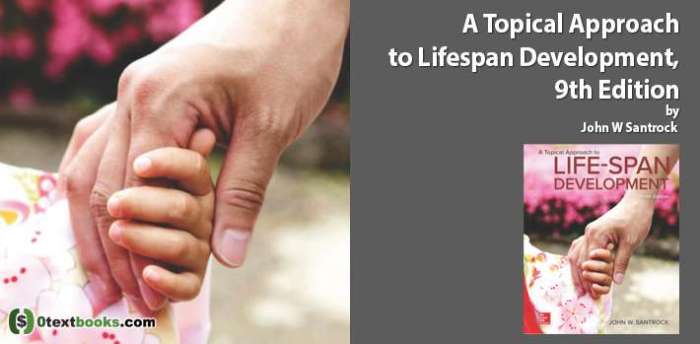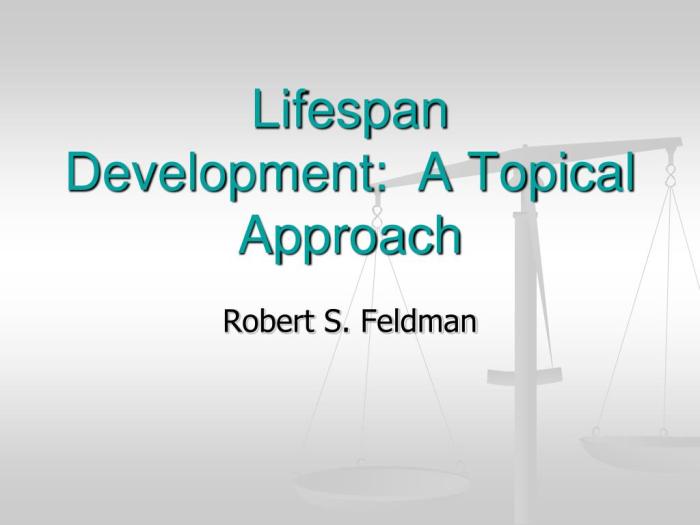A topical approach to lifespan development 11th edition pdf – A Topical Approach to Lifespan Development, 11th Edition, presents a comprehensive exploration of human development across the entire lifespan, from infancy to old age. This highly acclaimed textbook takes a topical approach, organizing content around key developmental domains, including physical, cognitive, social, emotional, moral, and personality development.
The 11th edition has been thoroughly revised and updated to reflect the latest research and advancements in the field.
This comprehensive guide provides a deep dive into the physical, cognitive, social, emotional, moral, and personality changes that occur throughout the human lifespan. With its in-depth analysis and research-based insights, this book offers a valuable resource for students, researchers, and practitioners seeking to understand the complexities of human development.
1. Introduction
A topical approach to lifespan development organizes the study of human development by focusing on specific topics or themes across the lifespan. This approach allows for a comprehensive understanding of how different aspects of development interact and influence each other throughout life.
The benefits of using a topical approach include:
- Provides a holistic view of development.
- Facilitates comparisons across different stages of life.
- Highlights the interconnectedness of different developmental domains.
The 11th edition of the textbook “A Topical Approach to Lifespan Development” provides a comprehensive overview of the field, covering the latest research and theories on physical, cognitive, social, emotional, and moral development across the lifespan.
2. Physical Development
Physical development refers to the changes in the body and brain that occur throughout the lifespan. These changes include growth in height and weight, changes in body composition, and the development of motor skills.
Factors that influence physical development include:
- Genetics
- Nutrition
- Physical activity
- Environmental factors
Physical development can impact other areas of development, such as cognitive development (e.g., through the development of fine motor skills), social development (e.g., through the development of physical abilities that allow for participation in social activities), and emotional development (e.g.,
through the development of body awareness and self-esteem).
3. Cognitive Development
Cognitive development refers to the changes in thinking, learning, and memory that occur throughout the lifespan. These changes include the development of language, problem-solving skills, and decision-making abilities.
Theories of cognitive development include:
- Piaget’s theory of cognitive development
- Vygotsky’s sociocultural theory of cognitive development
- Information-processing theory
Cognitive development can impact other areas of development, such as physical development (e.g., through the development of motor skills), social development (e.g., through the development of communication skills), and emotional development (e.g., through the development of self-regulation skills).
4. Social Development: A Topical Approach To Lifespan Development 11th Edition Pdf
Social development refers to the changes in social behavior, relationships, and social cognition that occur throughout the lifespan. These changes include the development of attachment, friendships, and romantic relationships.
Theories of social development include:
- Attachment theory
- Social learning theory
- Social cognitive theory
Social development can impact other areas of development, such as physical development (e.g., through the development of social skills that allow for participation in physical activities), cognitive development (e.g., through the development of language skills), and emotional development (e.g., through the development of empathy and self-esteem).
5. Emotional Development

Emotional development refers to the changes in emotions, emotional regulation, and emotional understanding that occur throughout the lifespan. These changes include the development of basic emotions (e.g., joy, sadness, anger, fear), the development of more complex emotions (e.g., guilt, shame, pride), and the development of emotional regulation skills.
Theories of emotional development include:
- Discrete emotions theory
- Dimensional theory of emotion
- Attachment theory
Emotional development can impact other areas of development, such as physical development (e.g., through the development of emotional regulation skills), cognitive development (e.g., through the development of emotional intelligence), and social development (e.g., through the development of empathy and social skills).
6. Moral Development

Moral development refers to the changes in moral reasoning, moral values, and moral behavior that occur throughout the lifespan. These changes include the development of a sense of right and wrong, the development of moral principles, and the development of moral behavior.
Theories of moral development include:
- Kohlberg’s theory of moral development
- Gilligan’s theory of moral development
- Social cognitive theory of moral development
Moral development can impact other areas of development, such as physical development (e.g., through the development of moral values that guide health behaviors), cognitive development (e.g., through the development of moral reasoning skills), and social development (e.g., through the development of moral values that guide social behavior).
Query Resolution
What is the main focus of A Topical Approach to Lifespan Development, 11th Edition?
The primary focus of this book is to provide a comprehensive overview of human development across the entire lifespan, encompassing physical, cognitive, social, emotional, moral, and personality development.
What are the key benefits of using a topical approach in studying lifespan development?
A topical approach allows for a more in-depth exploration of specific developmental domains, facilitating a deeper understanding of the complex interplay of factors that shape human development.
What makes the 11th edition of A Topical Approach to Lifespan Development unique?
The 11th edition has been meticulously revised and updated to incorporate the latest research and advancements in the field of developmental psychology, ensuring that readers have access to the most current and authoritative information.
